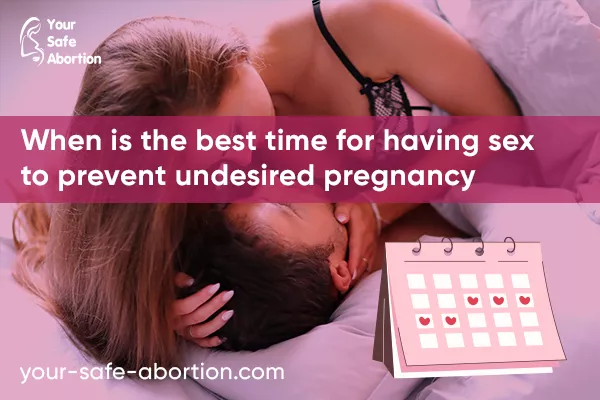
February 03, 2023 10:25
April 11, 2023 11:36
When Is The Best Time To Have Sex To Avoid An Unwanted Pregnancy?
Numerous women all around the world ask this question rather frequently. Therefore, to dispel this ambiguity, we have offered information regarding the right and ideal time to engage in sexual activity to avoid an unintended pregnancy. See more below.
A woman’s chance of becoming pregnant is sometimes between periods when ovulation takes place. The moment an egg is released from the ovaries is called ovulation. However, attempting to plan events for a “protected” moment may result in an unplanned pregnancy. It is pretty challenging to predict with any degree of accuracy when the egg will be delivered.
And when young women ovulate, they may have a few days of prolificacy. To avoid pregnancy, couples should use a more effective method of contraception prevention, such as patch or anti-conception medicine pills. And to help prevent STDs, always wear condoms.
How soon could you become pregnant following your period?
Following the sexual activity, sperm can survive in the uterus for up to five days, and pregnancy may result if semen is present in the uterus or fallopian tubes at the time of ovulation. Ovulation may occur for some women fourteen days into their cycle. However, it’s not a guarantee that you won’t become pregnant; engaging in unprotected sexual activity during your period or outside your typical productive window isn’t either.
If you have sexual activity when you are on your period, there is still a risk that you could become pregnant for women with shorter cycles (the average is 28 to 30 days). You can imagine, for instance, if you ovulate early and have a sexual activity just before the end of your period. The safest way to prevent pregnancy is always to use contraception, condoms, or another insurance method.
How do pregnancy and ovulation work?
When an egg is released from an ovary, ovulation occurs. An egg matures and is transported into the fallopian tube around monthly. At that time, it immediately moves toward holding up sperm in the uterus and fallopian tubes. An egg is appropriate between 12 and 24 hours after it begins to develop in the ovary. As many as five days can pass after sexual activity before sperm expires. Typically, 6 to 12 days following ovulation is when an egg implants after being prepared.
Following your period, you may become pregnant. Sexual activity at the end of your cycle and as you approach your reproductive window can cause that. However, it’s unlikely to become pregnant right before your period. The likelihood that you’ll think about it is low if you wait up to 36 to 48 hours after ovulating while on the menstrual cycle. The farther along in the month you are from ovulation, the less likely you are to become pregnant. The uterine lining will fall off if pregnancy is unsuccessful, and your menstrual cycle will start.
Takeaway
Having unprotected sex while on your period reduces your chance of becoming pregnant. So, if you’re facing an unintended pregnancy, you can safely purchase an abortion pill online. Decreasing your chance of becoming pregnant each month can be done by monitoring ovulation and determining your fertile period. A quarter of people who plan a family typically are disappointed. The best course of action if you need to prevent pregnancy is to talk to your doctor about a more potent form of anti-conception medicine.
SUMMARY
For some ladies, ovulation happens around 14 days of your cycle. Ovulation is the point at which an egg is delivered from the ovaries. Attempting to time things to a “protected” time can prompt a coincidental pregnancy. Having unprotected sexual activity during your period isn’t an assurance that you won’t get pregnant. Ovulation happens when a developed egg is delivered from an ovary.
Sperm can remain alive for as long as five days after sexual relations. Implantation of an egg, which occurs after preparation, as a rule, happens six to12 days after ovulation. Having unprotected sex during your period diminishes your possibility of pregnancy. The potential for pregnancy diminishes the further in the month you are from ovulation.

 Français
Français